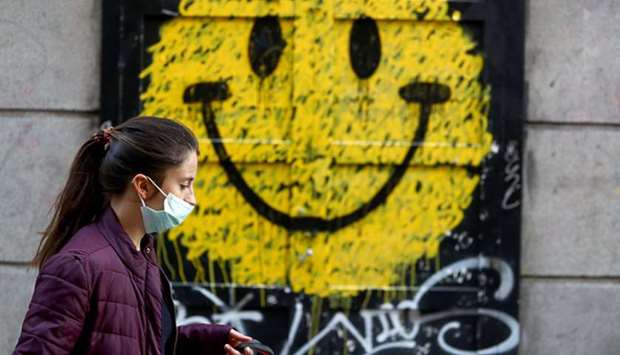The rate of new coronavirus infections and deaths in Spain slowed again yesterday as the country, suffering from one of the world’s worst outbreaks of the pandemic, began its fourth week under a near-total lockdown.
Deaths from the highly infectious Covid-19 respiratory disease rose to 12,418 on Saturday – the second-highest worldwide after Italy.
However, the toll of 674 people who died during the past 24 hours was down from Saturday’s 809 and well below Thursday’s daily record of 950, the health ministry said.
Yesterday’s rise represented a 6% increase in total deaths, about half the rate reported a week ago.
The total number of registered infections rose to 130,759 from Saturday’s 124,736.
“Today I unite (with colleagues) to give a small message of hope,” said General Miguel Angel Villaroya, chief of the defence staff, during a coronavirus briefing yesterday. “We are on the right track and we will beat it (the virus).”
The World Health Organisation (WHO)’s director for Europe, Hans Kluge, tweeted about Spain: “Careful optimism as result of bold measures, innovative approaches & courageous decisions.”
On Palm Sunday, a week before Easter, churches stood silent and empty in the capital Madrid, while streets that are usually packed with the stalls of the Rastro flea market were deserted.
Prime Minister Pedro Sanchez, in a televised address to the nation on Saturday, announced an extension of the state of emergency lockdown until April 26 to help tackle “the greatest crisis of our lives”.
He said that while lockdown measures would probably last even longer than the next 15 days, some economic restrictions, such as keeping all non-essential workers at home, would be lifted after Easter.
Shops, bars and restaurants will, however, remain closed.
Business groups CEOE and CEPYME warned that while the new extension “will serve to accelerate the exit from the current health crisis”, it could “deepen the economic recession in which many sectors and companies ... are already mired”.
They called for the government to extend aid for companies to €50bn ($54.04bn) from €20bn and suspend taxes for particularly badly hit sectors.
Economy Minister Nadia Calvino rejected the idea in an interview with El Pais.
Asked when Spain would get back to normal, Calvino said, “We cannot return to normal from 0 to 100 in one day. We must guarantee security.”
In an article published in a series of European newspapers yesterday, Sanchez appealed for unity among the 27 European Union countries to combat the coronavirus outbreak.
“Solidarity is a key principle of the EU treaties. And it is shown at times like this. Without solidarity there can be no cohesion, without cohesion there will be disaffection and the credibility of the European project will be severely damaged.”
Yesterday Italy’s health minister outlined plans for broader testing and beefed-up health services as part of a package of measures that would follow a future easing of the country’s coronavirus lockdown.
Roberto Speranza said it was too early to say when Italy would be able to lift the measures imposed across the country on March 9, when it became the first country in Europe to impose a general lockdown to slow the spread of the virus.
With more than 15,000 dead, Italy has the world’s highest death toll from disease, accounting on its own for almost a quarter of all deaths globally.
But the government is also grappling with the economic devastation caused by the sudden halt to business across the country.
“There are difficult months ahead. Our task is to create the conditions to live with the virus,” at least until a vaccine is developed, he told the daily La Repubblica newspaper, adding that some social distancing measures would also have to remain.
The smallest daily rise in Covid-19 deaths for nearly two weeks on Saturday and the first fall of the number of patients in intensive care have fed hopes that the epidemic may have reached a peak in Italy and focused attention on the next phase in the crisis.
The national lockdown, strictly limiting people’s movements and freezing on all non-essential economic activity, will officially last until at least April 13 but it is widely expected to be extended.
“If we’re not rigorous we risk throwing away all the efforts we’ve made,” Speranza said in separate comments to the Corriere della Sera daily.
Speranza said he had issued a note outlining five principles around which the government planned to manage the so-called “phase two” of the emergency, when lockdown restrictions begin to be eased but before a full return to normal conditions.
He said social distancing would have to remain, with wider use of individual protection devices such as face masks, while local health systems would be strengthened, to allow a faster and more efficient treatment of suspected Covid-19 cases.
Testing and “contact tracing” would be extended, including with the use of smartphone apps and other forms of digital technology while a network of hospitals dedicated solely to treating Covid-19 patients would be set up.
“Until a vaccine is distributed, we cannot rule out a new wave of the virus,” he said.

A woman walks past a closed shop in Madrid with a smiley painted on its door.
